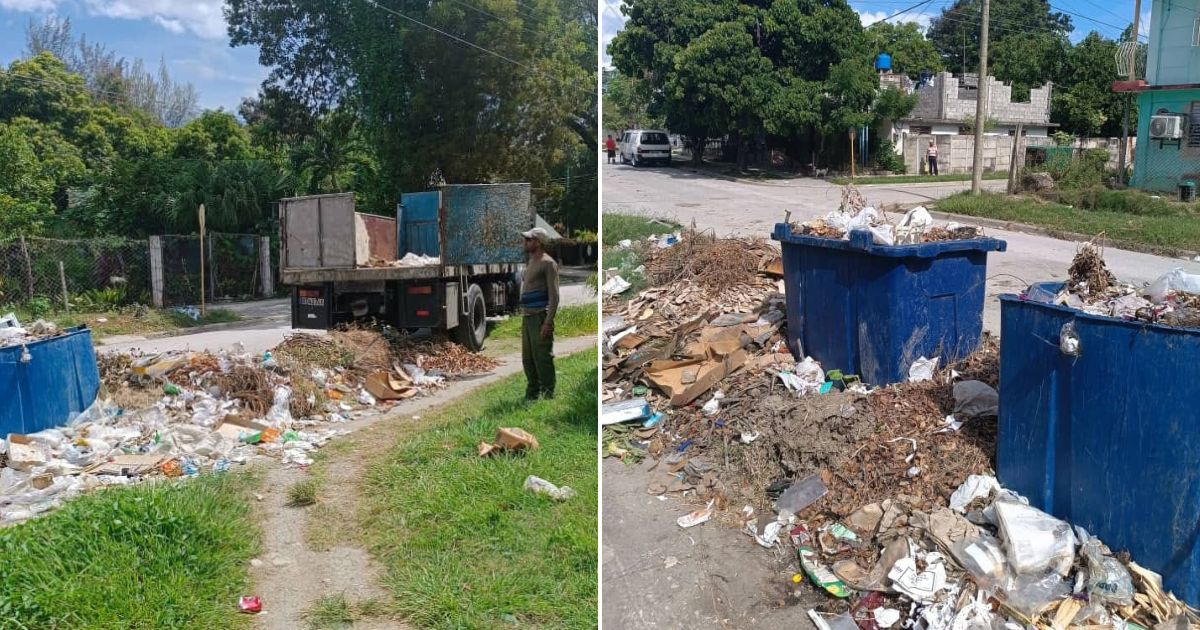The city government of Guantánamo, which has consistently shown its inability to manage solid waste collection, has had to rely on a private microenterprise to assist in this crucial task for the health of the population.
Official journalist Miguel Reyes reported on Facebook last Friday that the microenterprise Transnovoa contributed a truck to help clean up the city of Guantánamo. This initiative was presented as an achievement of the non-state economic sector.
While the post boasts about an idea aimed at urban sanitation, it also highlights the regime's inability to manage solid waste collection. If an efficient system existed, the participation of a private economic actor would not be necessary.
Additionally, the shared images suggest that the garbage had piled up for several days without the government finding a solution. Reyes also mentioned that "several truckloads of garbage were collected in the Cuartel and 14 Norte area," admitting that the initiative is "part of the city's sanitation strategy, which is dealing with various epidemiological viruses caused by mosquitoes and unsanitary conditions."
The province of Guantánamo is one of the Cuban regions that has confirmed the circulation of the Oropouche virus among the population. Therefore, the contribution of Transnovoa is part of the regime's desperate efforts to control this dangerous disease in the eastern part of the island.
In the comments section, Zulema Matos Columbié stated that the current situation in Guantánamo is a "environmental disaster," pointing to "those open-air garbage dumps" as the cause. She also blamed the lack of garbage bins in food vending areas and insisted that government inspectors should ensure their installation and maintenance.
Similarly, Marilyn Hamud stressed that the current state of solid waste collection shows that "the State cannot manage everything; it lacks the necessary resources to meet so many demands, leading to a chaotic situation where unsanitary conditions and epidemics grow daily." She suggested that the regime should allow a specialized private microenterprise to handle waste collection.
Scenes of accumulated garbage in public spaces are common in several Cuban cities. Recently, a man refuted claims that Santiago de Cuba is one of the country's cleanest cities, showing and denouncing the garbage dumps in the city's historical center.
In a video, a male voice can be heard walking through several streets, filming the accumulation of solid waste mixed with sewage, as published by journalist Yosmany Mayeta on Facebook.
Addressing Guantánamo's Waste Management Issues
This section answers some common questions about the waste management issues in Guantánamo and the involvement of private microenterprises in solving them.
Why did Guantánamo's government seek help from a private microenterprise?
The government sought help from Transnovoa due to its ongoing inability to manage solid waste collection effectively, which posed health risks to the population.
What does the involvement of Transnovoa signify?
The involvement of Transnovoa highlights the regime's failure to establish an efficient waste management system, necessitating the intervention of a private entity.
What are the consequences of poor waste management in Guantánamo?
Poor waste management in Guantánamo has led to unsanitary conditions, the proliferation of epidemics, and the outbreak of diseases like the Oropouche virus.
